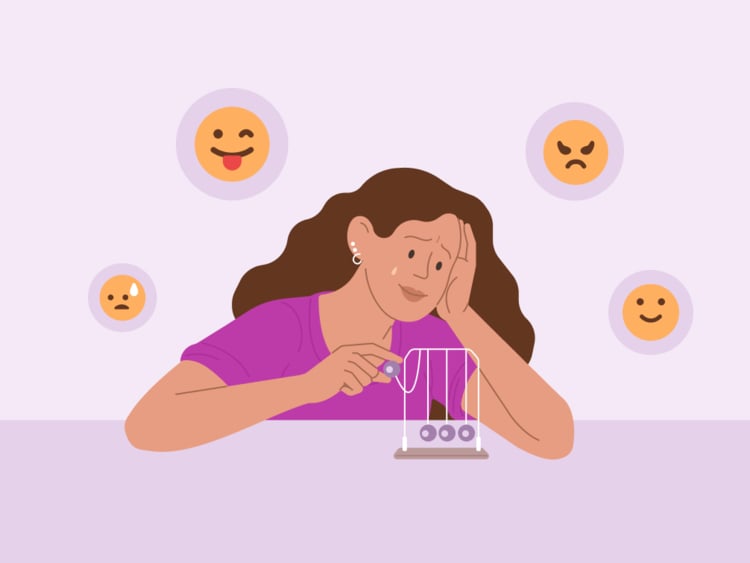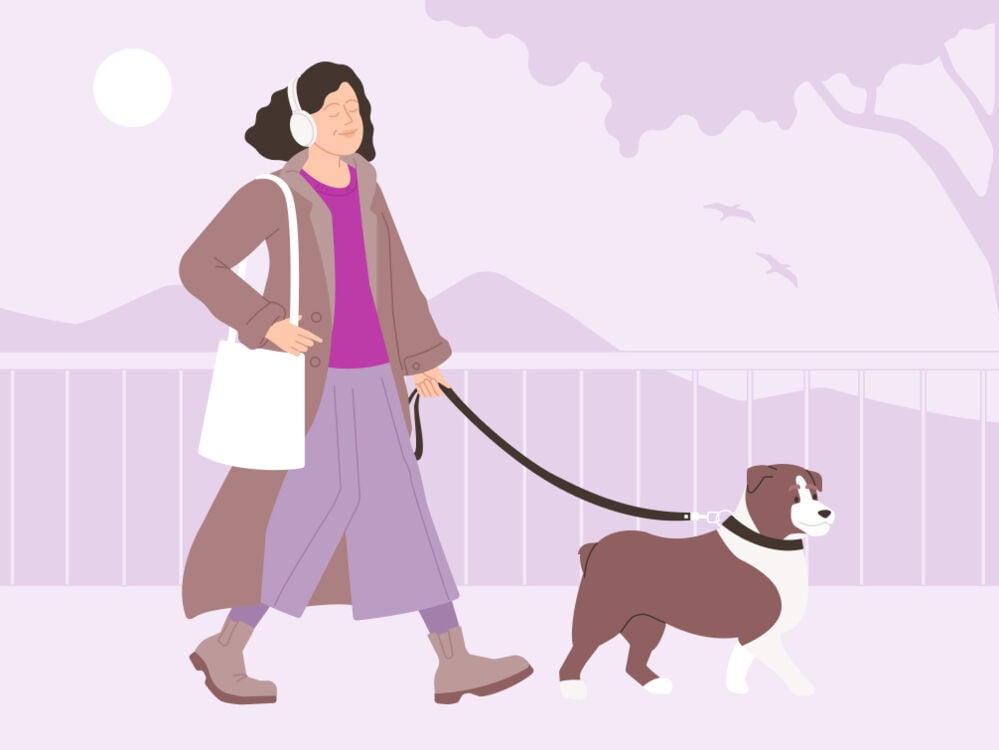Are your emotions on a roller coaster ride at around the midpoint in your cycle? Ovulation could be the explanation. Here’s why and how to deal with advice from a Flo expert.
-
Tracking cycle
-
Getting pregnant
-
Pregnancy
-
Help Center
-
Flo for Partners
-
Anonymous Mode
-
Flo app reviews
-
Flo Premium New
-
Secret Chats New
-
Symptom Checker New
-
Your cycle
-
Health 360°
-
Getting pregnant
-
Pregnancy
-
Being a mom
-
LGBTQ+
-
Quizzes
-
Ovulation calculator
-
hCG calculator
-
Pregnancy test calculator
-
Menstrual cycle calculator
-
Period calculator
-
Implantation calculator
-
Pregnancy weeks to months calculator
-
Pregnancy due date calculator
-
IVF and FET due date calculator
-
Due date calculator by ultrasound
-
Medical Affairs
-
Science & Research
-
Pass It On Project New
-
Privacy Portal
-
Press Center
-
Flo Accuracy
-
Careers
-
Contact Us
Does ovulation make you emotional? Here's the science


Every piece of content at Flo Health adheres to the highest editorial standards for language, style, and medical accuracy. To learn what we do to deliver the best health and lifestyle insights to you, check out our content review principles.
Lots of us experience mood swings just before our periods. But there’s another point in your cycle that can affect how you feel, too. It just might not be talked about as much.
Ovulation is the part of your cycle when one of your ovaries releases an egg. This process happens because of hormonal changes that trigger an egg to mature and be released. Since big changes in the way you feel can be attributed to hormone changes, you might notice you feel heightened emotions around this time.
So, let’s dive deeper into how and why ovulation can affect your mood. It can be good to know the signs of ovulation and how to track your cycle so you can better understand what’s typical for you and when you should see a doctor.
Key takeaways
- Hormone changes can impact the way you feel. So, if you consistently notice mood swings around the time that you’re ovulating, they may be the cause.
- The hormone estrogen spikes just before you ovulate and then dips right after. Estrogen is thought to affect the production of the “happy hormone” serotonin.
- That’s why you’re likely to feel calmer and happier in the first half of your cycle. Then, after ovulation, your mood may dip in line with your estrogen levels.
- If you experience cramps during ovulation, then this could also impact how you feel.
- Everyone experiences their cycle differently. Getting emotional during ovulation is totally normal, but you might never have experienced it before. Everyone is different.
- You can understand when you might be ovulating and what symptoms you might expect by tracking your cycle using Flo’s ovulation-tracking app.
Is it normal to get emotional during ovulation?
A lot is going on in your body throughout your cycle, and during ovulation, your hormones surge so your mature egg can be released.
You might have heard that hormones are crucial to your cycle but not be totally sure how. The crucial four to know at this point are follicle-stimulating hormone (FSH), luteinizing hormone (LH), progesterone, and estrogen.
- Just before ovulation, your FSH levels rise. This causes your follicles (small sacs of fluid in your ovaries), which contain eggs, to start growing and maturing. Your estrogen levels also rise in the days leading up to ovulation. They’re partially responsible for making your cervical mucus thinner so it’s easier for sperm to swim up your cervix to potentially meet your egg. Pretty clever, right?
- Just before ovulation, your body releases a surge of LH, which causes your ovary to release an egg.
After ovulation, your progesterone levels rise. This helps to prepare the lining of your uterus for a potential pregnancy. Your estrogen levels fall immediately after ovulation but then begin to rise again in the luteal phase.
Take a quiz
Find out what you can do with our Health Assistant
So, what do these hormones have to do with your moods? Well, some studies have found that higher estrogen levels are generally associated with a positive mood. Just before ovulation, “the most common emotion is a pleasant mood and more energy,” explains Dr. Jenna Beckham, obstetrician, gynecologist, and complex family planning specialist, WakeMed Health and Hospitals, Planned Parenthood South Atlantic, North Carolina, US.
This is because your estrogen levels can peak at this time, and estrogen has been linked to the production of serotonin, known as the human body’s “happy hormone.”
If you feel good just before ovulation, then you may be able to attribute it to rising estrogen levels. However, if you don’t notice any change in your mood at this point in your cycle, try not to worry. “Hormonal changes around ovulation can cause a wide variety of symptoms or no symptoms at all,” explains Dr. Beckham, and everyone’s cycle is slightly different.
What’s typical for you will be different for other people. Using a cycle tracker like Flo can help you better understand some of the common symptoms during your cycle and learn what’s typical for you.
Why do some people get emotional during ovulation?
Since everyone’s cycle is slightly different, it can be tough to give definitive answers about why you might feel a certain way at certain times. However, you might feel emotional after ovulation when your estrogen levels drop.
Your cycle can be split into two phases: your follicular phase and your luteal phase. These two parts of your cycle can be broken up by ovulation. Generally speaking, throughout your follicular phase, your estrogen levels rise. As estrogen has been linked to the production of the happy hormone serotonin, you may feel happier and more energized during this part of your cycle.

After ovulation, as you enter your luteal phase, your estrogen levels drop dramatically. Slowly, in the days following this, they will start to rise again. This is all because the cells that contain the egg you release during ovulation (known as the corpus luteum) produce estrogen and progesterone to prepare your body for pregnancy. However, like all hormonal changes, this can impact the way you feel.
Following ovulation, when your estrogen levels are lower, you might feel sadder or more irritated. Dr. Beckam explains that this is why some people feel lower in the week running up to their period starting. Mood swings are one of the most common premenstrual symptoms.
While your hormones are pretty powerful, they aren’t the only reason why you might feel emotional during ovulation. About 40% of us will experience ovulation pain at some point, and pain can, of course, affect emotions. Your hormone changes can also cause bloating.
How to care for your well-being during ovulation
It’s all well and good to read that mood swings are typical during your cycle, but when you’re going through the motions, it can be frustrating. However, Dr. Beckam explains that there are things you can do if you’re feeling emotional during ovulation, and the best place to start is to recognize how you feel.
If you feel energized or happy, then try and take advantage of that. “Exercise is great and perfectly safe to do,” says Dr. Beckham. Even if you aren’t feeling energetic, exercise may help with mood swings because it“can increase the release of endorphins, which may result in a more positive mood.”
If you’re feeling low, then give yourself the space to relax and lean into the activities that bring you comfort. That might look like seeing friends, walking, going to your favorite exercise class, journaling, or watching a TV show.
If you are experiencing some of the other symptoms that can be linked to ovulation, like ovulation pain, try using a heating pad to try to ease the pain. A warm bath might feel good. If this doesn’t work, then Dr. Beckham says painkillers “can be helpful.” However, if the pain you feel is enough to disrupt your life or daily activities, you should speak to your doctor.
Finally, if you’re prone to mood swings and feeling anxious during ovulation, it’s helpful to know when ovulation is coming. Be prepared by using an app like Flo to track your cycles.
When to see a doctor
“If the mood swings are severe or significantly affecting your daily life, you should definitely see your provider about it,” says Dr. Beckham. They will be able to walk you through how you’re feeling and what the next best thing to do will be. They may diagnose your mood swings as premenstrual syndrome (PMS) and may talk to you about more serious, rarer conditions like premenstrual dysphoric disorder (PMDD).
It’s crucial that if your mood changes are getting in the way of living your day-to-day life, then you should speak to your doctor.
More FAQs about feeling emotional during ovulation
Can ovulation make you cry a lot?
You might notice that your mood drops just after ovulation because your estrogen levels are lower.
Dr. Beckham points out that if you are prone to “significant mood swings,” you may be more likely to cry. However, if your mood changes mean you feel too low to do day-to-day tasks, you should speak to your doctor.
Can you control mood swings during ovulation?
If you are experiencing mood swings during ovulation, exercise, a healthy diet, and plenty of sleep can help to ease your emotions.
“Talk with a [healthcare] provider, a friend, a family member, or even a therapist if mood swings are particularly bothersome,” says Dr. Beckham.
Why do I get some moody after ovulation?
After ovulation, your estrogen levels drop, and your progesterone levels rise. This can impact your body’s capability to produce and release the happy hormone serotonin. That can “definitely make an individual feel irritable,” says Beckham.


Hey, I'm Anique
I started using Flo app to track my period and ovulation because we wanted to have a baby.


The Flo app helped me learn about my body and spot ovulation signs during our conception journey.


I vividly
remember the day
that we switched
Flo into
Pregnancy Mode — it was
such a special
moment.
Real stories, real results
Learn how the Flo app became an amazing cheerleader for us on our conception journey.
References
Charlewood, G. P. “Mittelschmerz or Ovulation Pain.” South African Medical Journal, vol. 32, no. 10, Mar. 1958, pp. 261–62, www.ajol.info/index.php/samj/article/view/172179.
“Corpus Luteum.” Cleveland Clinic, my.clevelandclinic.org/health/body/21849-corpus-luteum. Accessed 8 Aug. 2024.
“Dysmenorrhea (Menstrual Cramps).” Cleveland Clinic, my.clevelandclinic.org/health/diseases/4148-dysmenorrhea. Accessed 8 Aug. 2024.
“Estrogen.” Cleveland Clinic, my.clevelandclinic.org/health/body/22353-estrogen. Accessed 8 Aug. 2024.
“Estrogen: What It Does and 5 Benefits.” Cleveland Clinic, 5 Jan. 2022, health.clevelandclinic.org/what-does-estrogen-do.
“Exercise and Stress: Get Moving to Manage Stress.” Mayo Clinic, 3 Aug. 2022, www.mayoclinic.org/healthy-lifestyle/stress-management/in-depth/exercise-and-stress/art-20044469.
“Follicular Phase.” Cleveland Clinic, my.clevelandclinic.org/health/body/23953-follicular-phase. Accessed 8 Aug. 2024.
“Healthy Eating.” The American College of Obstetricians and Gynecologists, Dec. 2020, www.acog.org/womens-health/faqs/healthy-eating.
“Luteal Phase.” Cleveland Clinic, my.clevelandclinic.org/health/articles/24417-luteal-phase. Accessed 8 Aug. 2024.
“Ovulation Pain.” Cleveland Clinic, my.clevelandclinic.org/health/diseases/9134-ovulation-pain-mittelschmerz. Accessed 8 Aug. 2024.
“Mood Swings.” Cleveland Clinic, my.clevelandclinic.org/health/symptoms/mood-swings. Accessed 8 Aug. 2024.
“Ovulation.” Cleveland Clinic, my.clevelandclinic.org/health/articles/23439-ovulation. Accessed 8 Aug. 2024.
“Premenstrual Dysphoric Disorder (PMDD).” Cleveland Clinic, my.clevelandclinic.org/health/diseases/9132-premenstrual-dysphoric-disorder-pmdd. Accessed 8 Aug. 2024.
“Premenstrual Syndrome (PMS).” Mayo Clinic, 25 Feb. 2022, www.mayoclinic.org/diseases-conditions/premenstrual-syndrome/symptoms-causes/syc-20376780.
“Serotonin.” Cleveland Clinic, my.clevelandclinic.org/health/articles/22572-serotonin. Accessed 8 Aug. 2024.
“Sleep and Mood.” Harvard Medical School Division of Sleep Medicine, sleep.hms.harvard.edu/education-training/public-education/sleep-and-health-education-program/sleep-health-education-87. Accessed 8 Aug. 2024.
McLaughlin, Jessica E. “Menstrual Cycle.” MSD Manual, Consumer Version, Sep. 2022, www.msdmanuals.com/home/women-s-health-issues/biology-of-the-female-reproductive-system/menstrual-cycle.
Thiyagarajan, Dhanalakshmi K., et al. “Physiology, Menstrual Cycle.” StatPearls, StatPearls Publishing, 2022, www.ncbi.nlm.nih.gov/books/NBK500020/.




